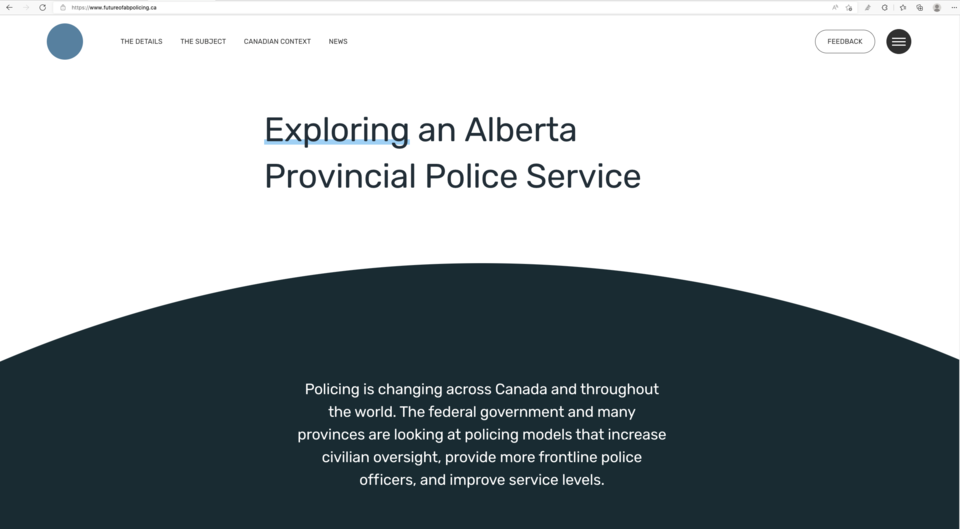While no official decision has been made on whether Alberta will swap out the RCMP for a provincial police force, the UCP government has released its plan detailing the projected "future of policing."
On Wednesday, the Province launched a website (futureofpolicing.ca) which it said is aimed at providing the public with information about the opportunities associated with a provincial police force. Some of which are improved civilian oversight, more front-line police officers and better service levels across the province, according to a press release.
The conversation on a provincial police force has been ongoing since 2020, when the Kenney government hired PricewaterhouseCoopers LLP (PwC) to conduct a feasibility study on the transition following a recommendation by the Fair Deal Panel.
Information brought to light by that study has been used by different parties on opposite sides of the issue, including the National Police Federation (NPF), which has been adamant in its objection. The NPF represents approximately 20,000 members across the country, 3,500 of which are in Alberta.
The province has said there will be no increased cost to municipalities should the transition go ahead. On the website, it explains that towns, counties, cities and villages would pay the same for Alberta Provincial Police (APP) service as they currently do under the Provincial Police Service Agreement, which expires in 2032. The federal government currently pays 30 per cent of Alberta's RCMP costs — about $185 million a year.
A key message in NPF's fight against the move is that Albertans would be paying more for less.
On its website, the union writes that taxpayers and municipalities would be "on the hook" for the full cost of the APP and the transition, which it said is currently estimated at approximately $366 million.
In direct opposition to the Province's claim that the APP would result in better service for municipalities due to more boots on the ground, the NPR claims the number of officers would decrease significantly, from 3,097 to 1,613.
PwC wrote in its final report that the annual operating cost for the APP is estimated at $735 million, which would include 4,189 full-time employees in 113 detachments.
In a bid to spread its message, the NPF toured the province late last year and early in 2022. Part of its argument against the APP, aside from cost and reduction in service, is that the majority of Albertans support the RCMP.
According to the NPF, a Pollara Strategic Insights survey conducted last fall found that just nine per cent of Albertans support the transition.
Also in that survey, 92 per cent of respondents said they wanted to see more detailed information on the cost of transition before a decision is made.
The Province said the website is meant to just that, among providing other information.
“Albertans have told us they want more details about the potential benefits of a provincial police service," Minister of Justice and Solicitor General Tyler Shandro said in a statement.
"As all levels of governments across the country review their policing models, Albertans need to have all the information available to ensure they lead this national discussion and make sure the future of policing in the province meets their needs.”
More than 70 groups and municipalities have signed on to the union's call to action, which recommends that taxpayer-funded resources be allocated to improve current policing services to reduce response times and address rural crime, improve funding to social services programs to address root causes of crime and increase supports to improve the efficacy and efficiency of the criminal justice system, according to its website.
The NPR said the transition study doesn't address how the APP would work to resolve these concerns.
Black Diamond and High River are in agreement with the federation, having signed on to the call. Okotoks and Foothills County were not on the list, which was released on June 27.



